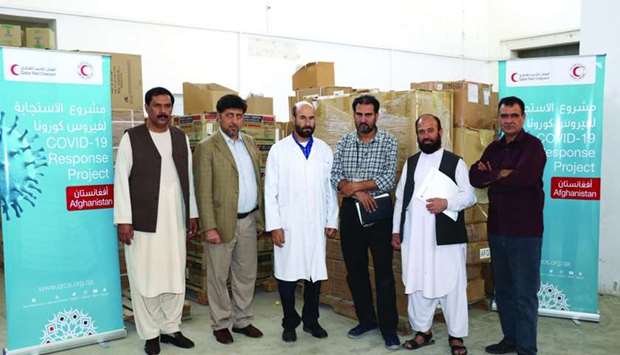The representation office of Qatar Red Crescent Society (QRCS) in Afghanistan has initiated a project to combat Covid-19 by providing personal protective supplies for 300 health workers at 50 primary healthcare facilities in remote areas, enabling them to serve the vulnerable population with maximum safety and security.
At a total cost of $40,000, funded by QRCS, these provisions are part of the projects to support Covid-19 control efforts in 22 countries across six continents.
In co-ordination with Afghanistan’s Ministry of Health (MoH), it is co-implemented by QRCS and the Afghan Red Crescent Society (ARCS) under a previously signed agreement.
After completing all the technical preparations and logistical requirements of the project, the medical and protective supplies were purchased and delivered, including masks, gloves, protective equipment, disinfectants and hand sanitisers. Currently, the deliverables are distributed to health facilities in the target provinces.
"The project is driven by QRCS’s sense of responsibility towards the brotherly people of Afghanistan, where the health authorities lack resources and supplies. It is an attempt to reduce the spread of the virus among local communities with a special focus on the underserved and inaccessible parts of the country," QRCS said in a statement.
These provisions consisted of 106 digital thermometers, 200 personal protective equipment (PPE) kits, 2,451 N95 masks, 300 medical mask packages, 300 medical glove packages and 300 hand sanitiser/disinfectant packages. As a main partner, ARCS was involved in all stages of the project, from selection of beneficiaries and contracting of suppliers to logistic and technical support.
Afghanistan is among the countries prone to the coronavirus pandemic and thousands of Afghan people have returned from abroad, which increases the chances of infection among the locals. There are no places or resources for quarantine, and most of the population suffer poor education and living conditions.
According to the MoH, the number of confirmed cases until the end of September was 39,074, with 1,444 deaths. With support from the World Health Organisation and other countries and humanitarian organisations, the national health authorities work hard to control the virus. For that purpose, an emergency response plan was developed, but the available resources remain inadequate, the statement added.
In co-ordination with Afghanistan’s Ministry of Health (MoH), it is co-implemented by QRCS and the Afghan Red Crescent Society (ARCS) under a previously signed agreement.
After completing all the technical preparations and logistical requirements of the project, the medical and protective supplies were purchased and delivered, including masks, gloves, protective equipment, disinfectants and hand sanitisers. Currently, the deliverables are distributed to health facilities in the target provinces.
"The project is driven by QRCS’s sense of responsibility towards the brotherly people of Afghanistan, where the health authorities lack resources and supplies. It is an attempt to reduce the spread of the virus among local communities with a special focus on the underserved and inaccessible parts of the country," QRCS said in a statement.
These provisions consisted of 106 digital thermometers, 200 personal protective equipment (PPE) kits, 2,451 N95 masks, 300 medical mask packages, 300 medical glove packages and 300 hand sanitiser/disinfectant packages. As a main partner, ARCS was involved in all stages of the project, from selection of beneficiaries and contracting of suppliers to logistic and technical support.
Afghanistan is among the countries prone to the coronavirus pandemic and thousands of Afghan people have returned from abroad, which increases the chances of infection among the locals. There are no places or resources for quarantine, and most of the population suffer poor education and living conditions.
According to the MoH, the number of confirmed cases until the end of September was 39,074, with 1,444 deaths. With support from the World Health Organisation and other countries and humanitarian organisations, the national health authorities work hard to control the virus. For that purpose, an emergency response plan was developed, but the available resources remain inadequate, the statement added.

